In praise of my mother’s garage

In the summer of 1984, my then-girlfriend Maire Anne and I left Austin, Texas, to return to Massachusetts. We were getting married, the wedding was in Boston (where both of our families lived), and we reasoned that if we returned to Austin, we’d likely do the things married couples do— meaning buy a house and have kids—and before we knew it, we’d be dug in there.
Thinking about how infrequently we’d seen our families since our move south, we decided that a pre-emptive return to Boston was in order. So we quit our jobs, rented a U-Haul truck, and headed north. I drove the truck while towing my recently-purchased, rust-free 1975 BMW 2002 named “Bertha,” and Maire Anne drove her ’69 Volkswagen camper. The only problem was that we had no jobs and nowhere to live.
Until my mother made us an offer we couldn’t refuse.
A year earlier, she bought a big, old 15-room three-story Victorian house in Brighton (Boston). It was built in 1900 by a Chicago plumbing magnate whose two sons were attending nearby Boston College. As originally built, the first floor was to receive guests, the bedrooms were on the second floor, and a back stairway ran from the kitchen to the servant’s quarters on the third floor. I’m sure that, back in the day, it was magnificent. However, a lot of history passed between 1900 and 1983, during which the house reportedly had stints as a boarding house, a “flop house,” a home for young women, and was rumored to have transitioned to being an, ahem, house of ill repute (the presence of a sink in every bedroom was a tip-off that the rumors were true).
When my mother bought it, the previous owner had subdivided the large downstairs rooms in order to rent to as many college students as possible. But she had a vision. She and my sister and her young family moved in, took down the rabbit-warren-like walls, and reconfigured the house as a quirky three-family where the first two floors were a mother-daughter home that shared an entrance and were open to each other, but the third floor was a separate rentable apartment.
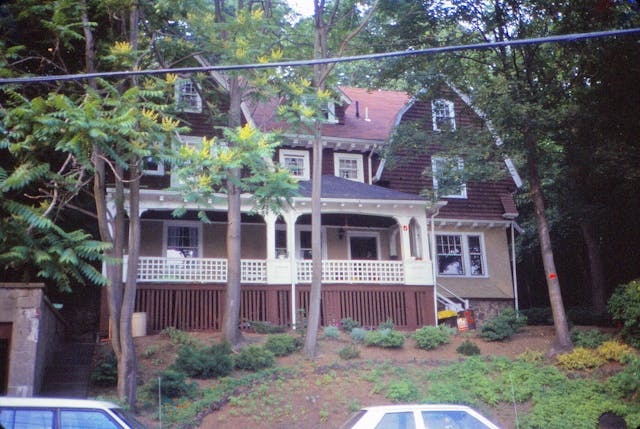
When we arrived after the long, hot drive up from Texas, my mother said to Maire Anne and me that the third-floor tenant had just left (more likely was gently nudged out) so we could move into the third floor and stay until we figured out what we wanted to do. So I unloaded the BMW 2002, returned the U-Haul, and we began our stay in what I still refer to as “my mother’s house.” The figuring-out-what-to-do part didn’t come until eight years later when we finally moved out. Looking back, my sister and I joked that our mother bought the house and then shamelessly tricked her two adult children into living with her.
The house had a two-car garage, both bays of which I instantly commandeered for my wrenching passion. Why my mother and sister allowed me to get away with this (which meant that they were kicked out to find curbside parking) is a mystery to me to this day, but I chalk it up to being the youngest child who had a long history of getting away with murder.
My time with the garage actually did not begin well. A few weeks after we moved in, I was backing the 2002 out and accidentally left the driver’s door ajar and caught the edge of it on the garage door jamb, bending it. I ordered a replacement door, shot it in gray primer, and installed it “for now,” thinking that I’d certainly get the car painted soon. Now, 39 years later, I still own the car, and it’s still wearing the gray-primered door.
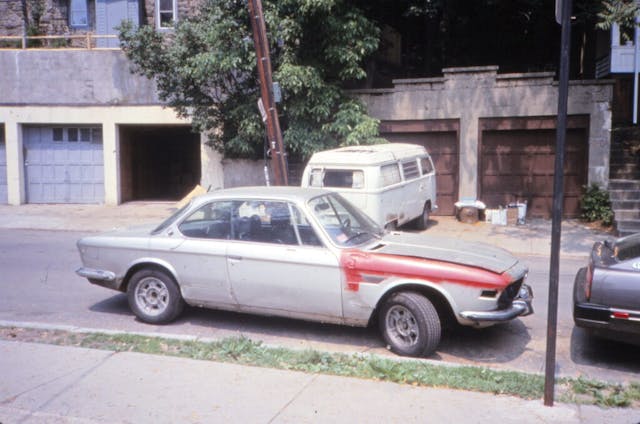
But that hiccup passed quickly. When it was clear that Maire Anne and I weren’t going anywhere anytime soon, I dug myself in. I vividly remember driving to Sears, buying the 2½-horsepower, 20-gallon compressor I still own, ordering the Central Pneumatic impact wrench and hose from a Harbor Freight and Salvage paper catalog, setting up the air tools in the garage, doing the first WHACKETA WHACKETA WHEEEEE, and thinking that I had arrived as a Hack Mechanic.

In the eight years we lived in my mother’s house, about 20 BMWs, six Vanagons, and an ’84 Alfa Spider cycled through those garages. I did an insane amount of work there. I installed engines. I lowered transmissions onto my chest. I even parted out a 2002 curbside and had the carcass hauled off as scrap, which I’m certain didn’t exactly endear me to my neighbors. The parts from it and other cars that were parted out off-property were stored under the front porch.
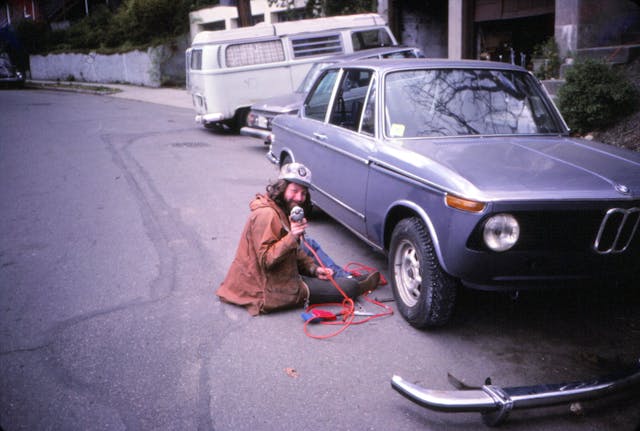
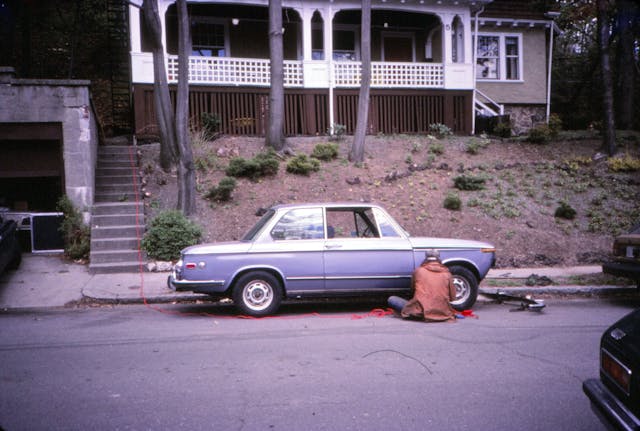
To be clear, the garage at my mother’s house wasn’t technically automotive ground zero for me. I began fixing cars when I bought the always-breaking Triumph GT6+ after I graduated high school. During the 2½ years I owned it, it spent nearly half that time on jackstands under the carport of my mother’s previous house in Amherst. And during Maire Anne’s and my stay in Austin, a dozen BMWs came and went from our little duplex on Speedway and West 35th Street. But the combination of the eight-year stint at my mother’s house and the two-car garage allowed me to stretch my automotive legs as never before.

Obviously, non-automotive things happened in the house as well. It takes the right dynamic to be able to move back in with your family. Moving in with your spouse’s family is another matter. But it was great. My family loved my wife, and she them. We had separate floors, so we weren’t always in each other’s business. Plus, Maire Anne and I had a band, and the house had a big basement we could rehearse in. When our first and second children were born, my mother was an always-ready babysitter. She had both of her kids and all of her grandchildren living in her house, so she was in heaven. It was wonderful.
When we were expecting our third child in 1992, Maire Anne and I needed more space and moved to the house we still live in in Newton. Garage-wise, the Newton house with its single corrugated metal garage was a huge downgrade from the one at my mother’s house, but I made due. It wasn’t until the new garage was built 15 years later and I sprung for the midrise lift that I felt like I’d outpaced what I had in Brighton.

The hoard of parts stayed under my mother’s front porch for decades. When, eight years ago, she politely asked me a fourth time to clear it out, I finally complied. I had a take-’em-away-for-free sidewalk sale of doors, transmissions, and subframes. A few items came back to Newton with me, most of which I later found homes for.
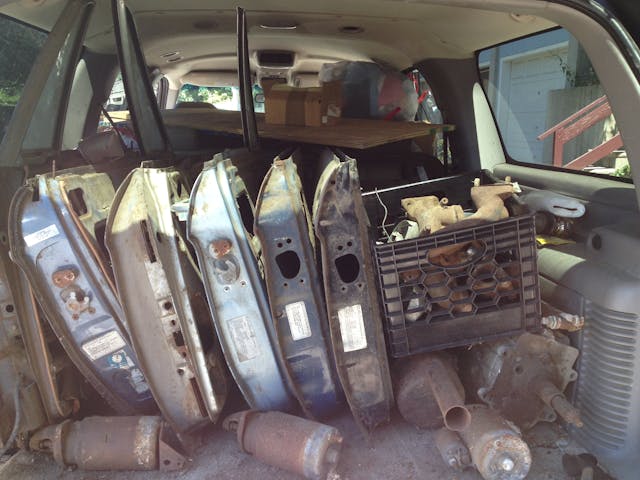
My mother passed in 2019, and my sister and I inherited the house. She and her husband continued to live in it, along with a commercial tenant on the first floor and my youngest son, who occupied our old third-floor apartment. But the house eventually became more than my sister wanted to deal with, and late last year we began the slow process of emptying it of people and stuff and readying it for sale.
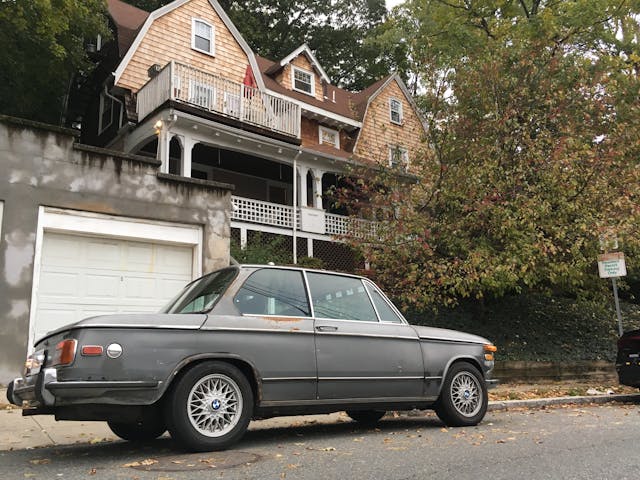
As I wrote here, the numbers-matching engine to my BMW 3.0CSi was still sitting in my mother’s garage. In addition, I found three rear windshields tucked away in what was literally the old coal room in the basement. I’m still trying to re-home them.

My sister moved out of the house in June, the junkman and the cleaners did their thing, and the house went on the market soon after. With rising interest rates, it wasn’t easy finding a buyer for a charming but still oddly-configured large house, but it eventually sold. We closed on it in early September.
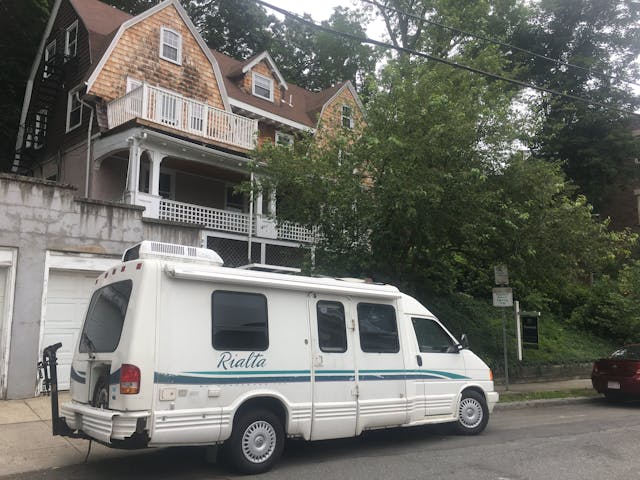
Although my wife and I lived in my mother’s house from 1984 to ’92, it was my family’s house for 40 years. Those memories will ring in my mind forever. The automotive aspect was narrow by comparison (it wasn’t as if I went back there and wrenched in the garage). But there’s no question that my life would’ve been very different had Maire Anne and I done what most folks would’ve had to do when we moved back from Texas—find a regular apartment with no garage.
I said above that it’s a mystery to me why I had free run of my mother’s garage, but that’s not true. I know why. My mother, who I routinely describe as the wisest person I’ve ever met, used to offer this parenting advice: “If your child shows interest in something, treat that like a flower. Because if you don’t, you’ll kill it with neglect, or worse.” It took me years to understand, but letting me monopolize the garage with a pampered classic and a series of highly questionable project cars while she and my sister parked on the street in the winter was one of a long list of times she “enabled the flower.”
Thanks, Ma.
Thanks, Brighton garage. The new owner isn’t a family, so it’s unlikely someone else will indulge their passions, buy something really stupid, work on it inside, skin their knuckles, and hone their Hack Mechanic skills. Here’s hoping my experience still resonates within.
At a minimum, you can probably still hear me swear from when I dented Bertha’s door 39 years ago.
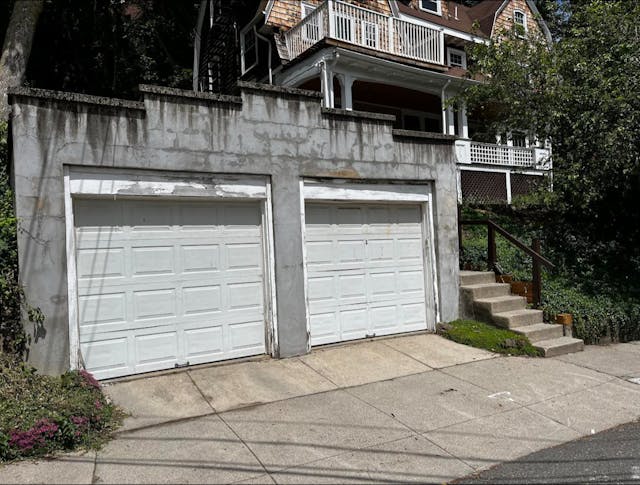
***
Rob’s latest book, The Best Of The Hack Mechanic™: 35 years of hacks, kluges, and assorted automotive mayhem is available on Amazon here. His other seven books are available here on Amazon, or you can order personally-inscribed copies from Rob’s website, www.robsiegel.com.
Check out the Hagerty Media homepage so you don’t miss a single story, or better yet, bookmark it. To get our best stories delivered right to your inbox, subscribe to our newsletters.


That’s “door jamb”.
Great story! Reminds me of my early college years. I rented one bedroom of three on the second story of an old row home in Akron, OH. The other two guys & I shared a small kitchen, bathroom, and had a separate staircase in the back. The landlady lived on the first floor with separate entrances. There was a dilapidated, wooden single car garage out back that she didn’t use. I was graciously allowed to use it for wrenching on my trusty Honda CB750, VW Beetle, and the Chevy 350 mid-engine Corvair project car. Back in the day that old “Corv-8” as we called it surprised a few people at the drag strip.
Good stuff Rob! Love the look of the two E9s. It must have taken several buckets of cash each month to heat that grand old home.
Marvelous article and a thoughtful
tribute to your mom!
Fun read. Having lived in smallish towns out west my entire life, I find things like “finding curbside parking” really foreign concepts, but wrenching in old, cramped garages, driveways, and under carports was certainly familiar to me in my younger days. I can only hope that I gave enough of the encouragement and freedom to pursue their passions to my own children that my folks gave to me – and obviously that your mom did to you, Rob.
Rob, what a nice story, thanks for sharing…
Parallel history here. I had gradually encroached on the cramped, dirt floor two-car at my mom’s house until I’d completely outgrown it and bought my current home in 1992, expressly because of the garage here. She passed a few months ago and the sibs and I are currently clearing it for sale.
Tinkerah, sure don’t envy you and the sibs – going through the home/possessions of a loved one can be quite difficult. But we found that we could ask all of her close friends and relatives what things of hers meant something special to them, and then see that those folks got something they listed was quite rewarding. It helped us to think that her memory was living on with those people and their homes.
I love this story, Rob. We are of roughly equal vintages and my life has been oddly parallel to yours, with vintage 2002s, seeking garages, and moving long distances while newly married. My cars have numbered over 70, and the patience of my wife is just like that of Maire Anne’s. I hope she is doing well after her health problems. Any updates on that?
Thanks for asking. She’s doing great.
Your mother was indeed very wise. I tried the same philosophy with my own kids, sadly my parents didn’t with me. I came onto wrenching in my 50s. Trying to make up for lost time.
Dear Rob: A great writing. Feel blessed with your long marriage and great family. There was a time when my garage on a little cul-de-sac in a “plain” part of town would open to show a Maserati Bi-Turbo Spider, and a tricked-out Mazda Rotary pick-up truck. With 3 kids in close proximity, it didn’t last long. But fun for about 6 months. (The kids loved getting transported to their little Catholic school in the exotic machinery!) -RDM
Another great story, Rob. Thank you.
A great tribute to your mom. You have some entertaining stories.
A beautiful piece of writing !
You are a great writer and this is a heartwarming story – thank you.
Thanks for another great piece, Rob. Love your wise mother’s maxim: “If your child shows interest in something, treat that like a flower. Because if you don’t, you’ll kill it with neglect, or worse.”
Glad to hear your wife is doing well.